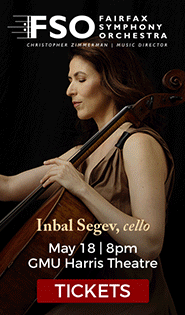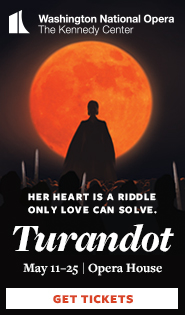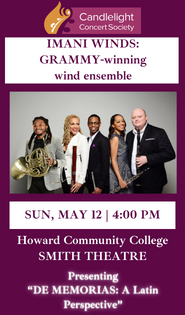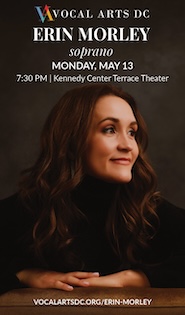Aided by a stellar soloist, Apollo Orchestra steps up its game in season opener
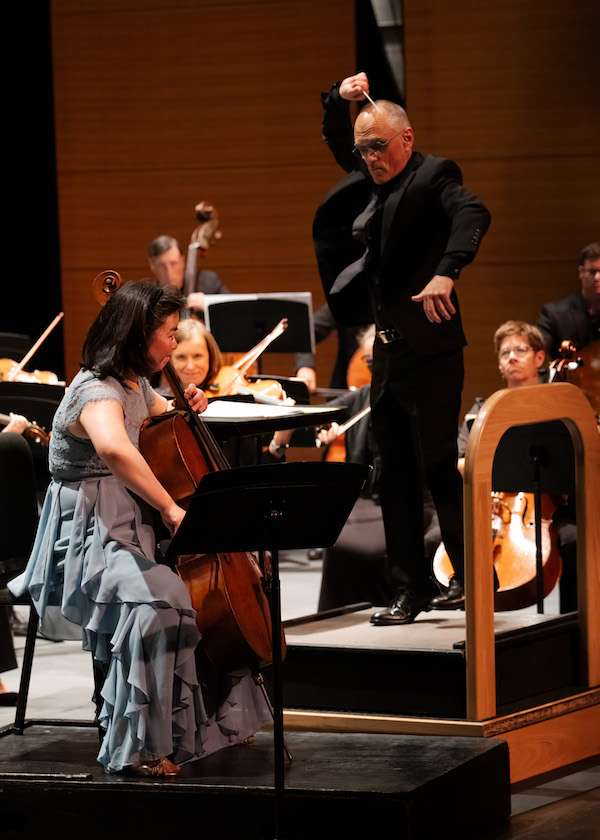
Hai-Ye Ni performed Barber’s Cello Concerto with David Neely conducting the Apollo Orchestra on Sunday. Photo: Eddie Sanders
The Apollo Orchestra opened its season of free concerts on Sunday afternoon, led by David Neely at the Cultural Arts Center of Montgomery College. The ensemble has shown a greater sense of organization this year by announcing all six of its concert programs at the start of the season, half of them conducted by Neely and half by David Chan. These concerts are always open and free to the public, thanks to the support of the Downing Family Foundation.
The concert opener, the Overture to Wagner’s The Flying Dutchman, presented a large sonic canvas for Neely and the musicians. The brass, so important in this composer’s works, were generally solid, with a few more insecurities in the horns than one might hope. The strings sounded somewhat anemic, but the sense of epic sweep came across, as this dramatic overture telescoped the whole story of the opera into its ten-minute length.
Major kudos to Neely for leading a rare performance of Samuel Barber’s Cello Concerto. The piece is widely considered to be too difficult and unrewarding, a false impression that this rendition did much to dispel. Rather than listing toward the acerbic side of the piece, Neely and the musicians sought and found the cool, modern sleekness of the work, premiered in 1946, and especially its melodic power.
The beauty of the interpretation blossomed from the playing of Hai-Ye Ni, principal cellist of the Philadelphia Orchestra. The solo part, premiered by Raya Garbousova, is daunting in many ways: near-constant playing in all three movements, with exposed high writing, including harmonics and awkward double-stops. Ni, who made an equally impressive appearance with this orchestra last year, not only tamed all these demands but did so in keeping with the musically sensitive approach she took to the whole work.
The cadenza of the first movement, for example, never felt forced or even challenging, although it certainly is. The main focus was on the sense of musical climax, and largely ignoring the overly fussy dynamics and other markings in the score. The second movement proved the highlight of the experience, with Ni’s ardent tone intertwined with the pastoral solo from principal oboist Noelle Drewes, over gorgeous muted strings.
Although much of the slow movement involves subtly shifting irregular meters, Neely helped the ensemble smooth over those shifts in a flowing, serene legato. The Finale, fueled by much more aggressive irregular meter, danced elegantly over potentially thorny dissonances. Here Ni’s double-stops, even high in the instrument’s range, sang out and with near-perfect intonation, even as she emphasized musical line, even in the most difficult sections.
Neely concluded the program with a thoughtful performance of Brahms’ Second Symphony, one in which each movement felt stamped with decisive ideas about tempo, balance, and texture. The ensemble still has some weaknesses from section to section, shortcomings that came out here as well, but Neely chose generally slower tempos that helped the musicians bring out the interior focus of Brahms.
The first movement flowed serenely, with elegiac horn and wind lines. Neely gave clear gestures that elucidated the Brahmsian sense of metric dissonance, by which the composer shook up expectations for the predominant meter with hemiola and other rhythmic deceptions. The emphasis here and in the second movement was on warmth, even at the loudest dynamics.
It is a rather sunny piece, especially given Brahms’ disposition toward gloominess. The gentle pacing of the third movement aided this impression, with a light-footed bounciness in the Presto ma non assai section. Even in the Finale, marked Allegro con spirito, Neely held the orchestra back, a sense of reserve suiting the music.
During the ovations, Neely drew attention to the presence of his soloist, Hai-Ye Ni, who had taken a seat at the rear-most desk of the cello section. It is true that this symphony has some gorgeous cello parts, and it was a treat to have this fine musician, who has led her own orchestra’s section in it many times, lend her distinctive voice to this performance.
David Neely conducts the Apollo Orchestra in operetta and zarzuela excerpts, with soprano Kresley Figueroa and baritone Javier Arrey, 4 p.m. October 22. apolloorchestra.com
